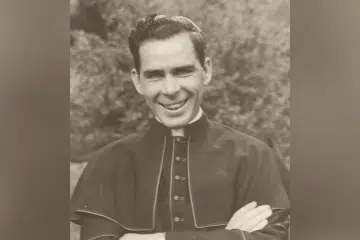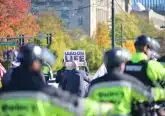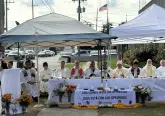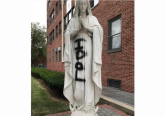Delaware agrees to treat church services neutrally in settlement over COVID restrictions
CNA Staff, Nov 13, 2020 / 04:40 pm MT (CNA).- The governor of Delaware has settled a federal lawsuit over church-related COVID-19 restrictions, which he had imposed at the start of the pandemic in March.
In exchange for dropping the lawsuit, Governor John Carney agreed this week that in any future emergency requiring state actions, he “must treat churches and religious worship in a neutral manner,” DelawareOnline reported.
Rev. Dr. Christopher Alan Bullock, pastor of Canaan Baptist Church in New Castle, filed the lawsuit challenging the state’s coronavirus restrictions in late May.
Bullock argued that the restrictions that Carney had placed on houses of worship, but not other categories of essential businesses, were unconstitutional.
Carney had imposed restrictions on houses of worship such as requirements that church services not last longer than one hour, with a hard limit of 10 people allowed inside, instead of a percentage of the listed fire capacity.
Services were encouraged to be outdoors if possible, choirs were banned, masks were required, and those who were over the age of 65 were instructed to stay away from a house of worship. Worship leaders also were prohibited from “holding” a congregant, including for a baptism.
Bullock’s lawyer argued that the guidance prohibiting a pastor from touching someone being baptized was discriminatory, as there was no similar ban on person-to-person contact for a Jewish circumcision or for a childcare worker taking care of a child.
Under the terms of the settlement, Delaware may not impose a 10-person limit only on houses of worship, and houses of worship must be listed as “essential” if such business or activities are listed in the future.
In addition, church services cannot be time-limited, and cannot be limited to only one service per week. Mask wearing and social distancing cannot be applied solely to churches, nor can age-based attendance limits. Restrictions solely applying to religious practices such as baptism or communion are forbidden.
Carney had already updated the state’s coronavirus guidance in June in response to Bullock’s lawsuit.
As of June 2, the number of people allowed to gather in a house of worship was adjusted to match that of other businesses during the phased reopening. Additionally, previous limitations on baptisms and the distribution of Communion are now encouraged, but not mandatory, according to the June 2 guidance.
Evidence suggests that church services following public health guidelines do not present a greater risk of spreading the novel coronavirus than other similar activities, doctors said in an August article for Real Clear Science.
Washing hands, social distancing, and mask requirements have helped prevent the spread of COVID-19, even in cases when contagious, pre-symptomatic parishioners took part in church events, wrote doctors Thomas McGovern, Deacon Timothy Flanigan, and Paul Cieslak, members of the Thomistic Institute Working Group on Infectious Disease Protocols for Sacraments & Pastoral Care.
Delaware is not the first state to face lawsuits over apparently unequal restrictions on houses of worship versus other similar gatherings during the pandemic.
In Illinois, which had one of the strictest reopening plans in the country in terms of its limits on public gatherings, churches have brought at least three lawsuits alleging that the state illegally discriminated against religion and violated the U.S. and Illinois state constitutions, as well as the state’s Religious Freedom Restoration Act.
In response, the state of Illinois in May relaxed its restrictions on churches after Supreme Court Justice Brett Kavanaugh ordered the state to respond to the three lawsuits.
Illinois’ governor said that the state’s public health department would be issuing “guidance, not mandatory restrictions” for faith leaders to hold religious services, loosening the state’s restrictions on religious gatherings during the pandemic.
A Pentecostal church in San Diego sued in early May over California’s restrictions, saying that the state had violated First Amendment freedoms by forcing churches to remain closed while allowing some businesses to reopen during the pandemic.
The church asked the U.S. Supreme Court to intervene in its case. The Supreme Court sided with the state of California, as well as with the state of Nevada in a similar case.
Later in May, the California health department said that, subject to the approval of local authorities, churches in the state could begin reopening along with in-store retail shopping, originally allowing houses of worship to hold religious services at up to 25% capacity with a maximum of 100 attendees.
In late October, a federal judge ruled that Colorado officials may not enforce anti-coronavirus limits against two churches, saying that the state rules lacked sufficient exemptions for the free exercise of religion.
Colorado’s regulations treated churches more strictly than similar gatherings, which are required to observe social distancing but not observe occupational limits as well, the judge said, adding that the rules failed to protect congregations that may wish to remove facial coverings for religious reasons.
On Thursday, the Diocese of Brooklyn asked the U.S. Supreme Court for relief from the state of New York’s COVID rule, which Gov. Andrew Cuomo imposed in October, limiting attendance at some diocesan churches to just 10 people while allowing some businesses to remain open without capacity limits.













